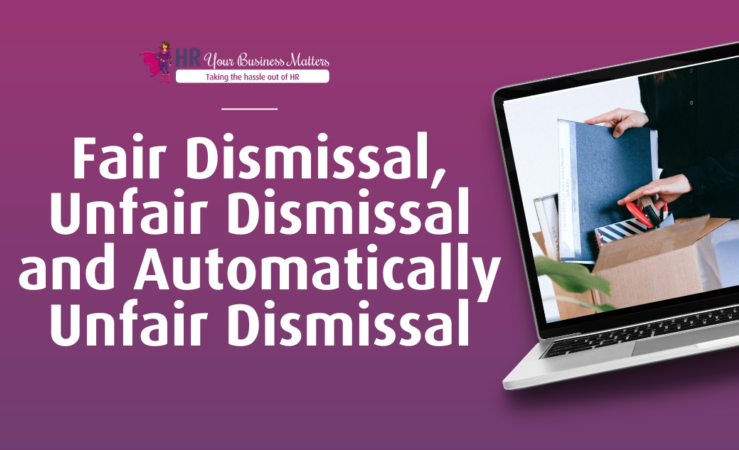
Something I come across on a weekly basis is the comment “if they have less than 2 years of service, it’s safe to exit an individual without process”. Excuse my bluntness within this blog but in fact, this is not only a misguided error but something that can potentially cause a significant risk to your business.
The truth is, yes, employees do need two years of service to bring a claim for unfair dismissal, but that doesn’t mean all laws, rules, and regulations go out the window just because they have less than 2 years’ service.
In this article I will explain the truth behind the myth surrounding fair and unfair dismissal, including automatically unfair dismissal, helping you as a business owner make an informed decision when it comes to dismissing an employee. Let’s start by looking at the differences between the terminology.
Fair Dismissal
There are 5 fair reasons to dismiss an employee, these are:
- Conduct: If an employee commits an act of misconduct
- Capability: If the employee does not have the capability for the role
- Redundancy: If an employee is made redundant
- Illegal to employ: If a statutory duty arises
- SOSR
SOSR is Some Other Substantial Reason. This can include third party pressure and, in some cases, breach of mutual trust and confidence. SOSR has come under fire in recent years as when used on its own, SOSR may be considered as a weak reason for dismissal. If you feel that SOSR is your only option for dismissal, getting the right advice is a good move.
Now, if you make a decision to dismiss an employee using the reasons above, you may think it’s fair. However, if you don’t follow the correct processes detailed within your contract of employment and by following ACAS guidance, you may not only have an unfair dismissal case to defend but also a breach of contract claim.
It’s important to read and understand the documentation in place within your business regarding dismissal. If, for example, it states a certain disciplinary process applies, then you should follow it. If it states the disciplinary process doesn’t apply for various reasons, such as less than 2 years’ service, then again you may have more options available in managing the dismissal.
Unfair Dismissal
So, we’ve talked about the fair reasons for dismissal. But what about unfair dismissal?
Unfair dismissal is the legal term that refers to a situation where an employee is dismissed in a way that is considered to be unjust or unreasonable. This can happen for a variety of reasons, but it is generally characterised by an employer failing to follow the proper procedures for termination, or by dismissing an employee for reasons that are prohibited by legislation, such as a protected characteristic.
Ordinarily an employee needs 2 years’ service in order to bring a claim for unfair dismissal.
Automatically Unfair Dismissal
Under UK legislation, there are certain circumstances in which a dismissal is considered “automatically unfair” and the employee does not need to have worked for you for a minimum period of time to bring a claim for unfair dismissal. These circumstances include:
-
Discrimination
If an employee is dismissed because of a protected characteristic such as their age, sex, race, religion or disability.
-
Whistleblowing
If an employee is dismissed because they have made a protected disclosure, or are treated badly because of whistleblowing, this is automatically unfair. A protected disclosure is a report of wrongdoing or malpractice, made in the public interest.
-
Asserting a statutory right
If an employee is dismissed because they have asserted a statutory right, such as taking maternity or paternity leave, or requesting flexible working.
-
Trade union membership or activities
If an employee is dismissed because of their membership of a trade union or because they have engaged in trade union activities.
-
Health and safety
If an employee is dismissed because they have raised concerns about health and safety issues.
If an employee believes that they have been dismissed in one of these circumstances, they may be able to make a claim for automatically unfair dismissal to an employment tribunal. It is important to note that in most cases, the employee must have been dismissed to bring a claim for unfair dismissal, although there are exceptions, such as where the employee resigns in response to a fundamental breach of contract by the employer.
How Can It Go Wrong?
So let us provide you with an example of how you may unknowingly fall foul of a claim by not having a thorough understanding of dismissal and procedure.
Example 1
You have an individual that is relatively new to the business and is showing behaviours that do not fit with the values and expectations set out by the business. You have met informally with the individual and provided feedback as well as given re-training and coaching with a buddy.
After no improvement is seen, you bring the individual’s employment to an end. After the dismissal has taken place, you receive notification from ACAS that there has been a case raised against you for automatically unfair dismissal based upon discrimination of a protected characteristic.
Now you know whole heartedly that your decision to dismiss was not based on any form of discrimination, however upon review you find that as you failed to follow any formalised process, there is no evidence such as meeting notes, training records, summary of conversations and areas needing improvement required. As a business owner you are now on the backfoot defending a claim of automatically unfair dismissal because you believed no process was needed as the individual was less than 2 years’ service.
Example 2
Unfortunately, due to a downturn in business, you are having to restructure, which is going to cause redundancies. You end an individual’s employment based on redundancy and the role no longer being required. You understand there are legal reasons to understand when making a role and therefore an individual redundant and believe you have followed this principle when making your decision. The individual hasn’t got 2 years’ service, and therefore isn’t entitlement to redundancy pay. You use the clause within your contract of employment and pay their 1 month’s contractual notice in lieu of them working.
You receive notification from ACAS advising of a claim based on non-payment of redundancy pay. As a business owner you haven’t realised that when making a role redundant if the individual’s statutory notice (not contractual) takes them over the 2-year service mark, they are entitled to redundancy pay.
Summary
From working with clients for as long as we have, we believe that it is incredibly rare that employers make the wrong decisions with the intention to do so. Much more common is that you make the decisions that you believe are correct to make. However unfortunately, sometimes these decisions are wrong and therefore, you end up defending a claim that can cost you time and money but also knock your confidence as a leader and a business owner.
If you need any support with making a dismissal within your business, whether it be a dismissal that needs to take place or training and upskilling, please get in touch with us on 01733 739660.

